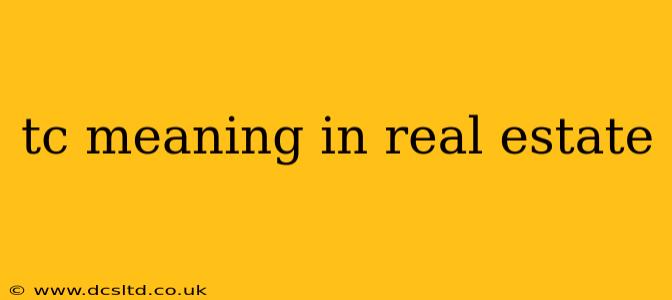Decoding "TC" in Real Estate: Understanding Transaction Costs
The abbreviation "TC" in real estate commonly stands for Transaction Costs. These are the various expenses incurred during the buying or selling process, extending beyond the purchase price itself. Understanding these costs is crucial for both buyers and sellers to accurately budget and manage their financial expectations throughout the real estate transaction. This article will delve into the specifics of transaction costs, answering frequently asked questions to provide a comprehensive understanding of this vital aspect of real estate dealings.
What are the typical transaction costs involved in buying a home?
Transaction costs for homebuyers are multifaceted and can significantly impact the overall financial commitment. These costs typically include:
-
Down Payment: This is the initial upfront payment made towards the purchase price, usually expressed as a percentage (e.g., 5%, 10%, 20%). A larger down payment often translates to a lower mortgage interest rate and smaller monthly payments.
-
Closing Costs: These encompass various fees paid at the closing of the transaction. Examples include appraisal fees, title insurance, lender fees, recording fees, and potentially prepaid property taxes and homeowner's insurance. These costs can vary depending on location and the specific terms of the sale.
-
Loan Origination Fees: These are fees charged by lenders for processing and originating your mortgage loan.
-
Home Inspection Fees: Hiring a professional home inspector to assess the property's condition before finalizing the purchase is highly recommended. The fee for this service covers the inspector's time and expertise.
-
Real Estate Agent Commissions: Unless you're representing yourself (a for-sale-by-owner transaction), you'll typically incur real estate agent commissions, which are usually split between the buyer's and seller's agents.
-
Property Taxes (Prepaid): Often, buyers are required to prepay a portion of the property taxes at closing, depending on the local tax assessment cycle.
What are the typical transaction costs involved in selling a home?
Selling a property also involves a range of transaction costs, notably:
-
Real Estate Agent Commission: As mentioned earlier, sellers typically pay a commission to their listing agent, often a percentage of the sale price.
-
Closing Costs: Similar to buyers, sellers also incur closing costs, which may include preparing the necessary documentation, paying off existing mortgages, and covering transfer taxes.
-
Staging Costs (Optional): Some sellers invest in staging their homes to enhance their appeal and potentially increase their selling price. These costs are optional but can prove valuable.
-
Repair Costs: Addressing any necessary repairs or improvements before listing the property can help expedite the sale and potentially fetch a higher price.
How much do transaction costs typically add up to?
The total amount of transaction costs varies considerably depending on factors such as the property's price, location, financing terms, and the complexity of the transaction. Generally, buyers can anticipate closing costs ranging from 2% to 5% of the home's purchase price, while sellers' costs might fall within a similar range. It's essential to get precise cost estimates from your real estate agent, lender, and other relevant professionals to avoid unexpected financial burdens.
Are there ways to reduce transaction costs?
While some transaction costs are unavoidable, others can be mitigated with strategic planning. For example, negotiating favorable terms with your lender can lower loan origination fees. Exploring different mortgage options can also result in significant savings. Additionally, working closely with your real estate agent to strategically price your home can potentially minimize the time on the market, and subsequently reduce carrying costs (such as mortgage payments) during the listing period.
What should I do if I'm facing unexpected transaction costs?
If you encounter unforeseen transaction costs, the best approach is to immediately communicate with your real estate agent, lender, and closing attorney. Transparency and open communication are crucial to resolving any issues and finding suitable solutions. Exploring options like requesting a closing cost waiver from your lender or negotiating with the seller might be possible depending on the situation.
By thoroughly understanding transaction costs and actively engaging with all parties involved, you can navigate the real estate process effectively and confidently. Remember that professional guidance from experienced real estate agents and financial advisors is invaluable throughout this process.
